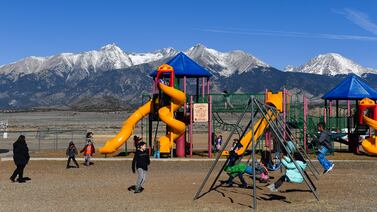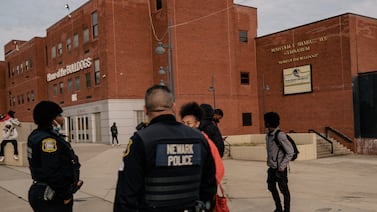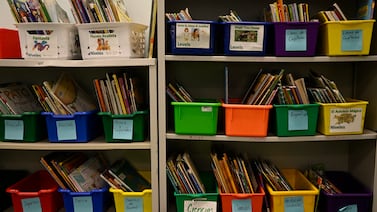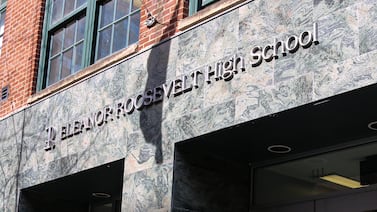Sign up for Chalkbeat Chicago’s free daily newsletter to keep up with the latest education news.
The Chicago Public Schools inspector general is raising red flags about potential waste and fraud — particularly in areas where the district has spent more than $2 billion in federal COVID recovery money.
In his annual report out Tuesday, CPS Inspector General Will Fletcher also outlined eight cases of substantiated sexual abuse of staff on students, and recommended more consistent training on sexual misconduct for vendors who provide services to schools.
The report — which details the inspector general’s work from the previous fiscal year, or July 1, 2022 to June 30, 2023 — highlighted the office’s investigation into lost or stolen laptops and other technology valued at at least $23 million and, for the second year in a row, detailed cases of fraud and potential mismanagement of extra pay for staff.
The OIG found that CPS marked at least 77,000 devices as lost or stolen during the 2021-22 school year, often with little or no effort to find those devices, according to the report.
The OIG’s review comes after Chalkbeat and WBEZ found the district spent tens of millions of federal COVID relief dollars on technology without a reliable system for tracking those devices.
“CPS spends a couple of million dollars on software and other assets that try to monitor and keep track of their assets, and we found out that that system is just very flawed,” said Fletcher, in an interview Monday with Chalkbeat.
District officials are “concerned about the loss of any public asset,” and are working to improve their tracking systems and hold staff accountable to district policies in how to manage devices, a CPS spokesperson said.
At three dozen schools, all of the devices assigned to students were listed as lost or stolen, according to the OIG’s review of audits schools submitted of their technology inventory during the 2021-22 school year.
“When we followed up with the schools, we would talk to people who had an asset or a laptop or a Chromebook that was issued to them that was marked as lost or stolen — that in fact wasn’t,” Fletcher said. “There were a few interviews with people who reached into their desk and said, ‘Hey, I got this laptop, no one ever asked me for it.’”
Incorrectly labeling devices can lead the district to purchase replacement devices “at taxpayer’s expense,” the OIG noted.
During the time period the OIG investigated, the district spent $2.6 million on services meant to keep track of and recover the technology, the report said. Fletcher described the district’s tracking system as “very flawed,” mainly because there isn’t enough of an effort to find devices. In July, the district sent messages to 50,000 reportedly lost or stolen devices in order to recover them. As of Monday, the district has recovered more than 12,000 devices, a district spokesperson said.
Almost all of them were “in schools and were simply missed in the previous inventory cycle,” the spokesperson said.
There isn’t enough training for how schools should track their devices, leaving the district with flawed or incomplete data that’s not credible or enough to use to determine if criminal activity, such as theft, might have taken place, Fletcher said.
Between March 2020 and August 2023, Chalkbeat and WBEZ previously reported, the district spent more than $308 million on computers and other technology from its three main vendors — Apple, CDW, and Virtucom. The amount was roughly as much as these companies got paid during the previous two decades combined.
District officials said they bought nearly 311,000 laptops and tablets during that time, but more than 41,000 of the devices were sitting in a warehouse or yet to be shipped by a manufacturer. They also cited a lack of dedicated staff at schools to do inventory as an issue. According to district data, roughly 35% of schools had a technology coordinator.
The OIG’s office has recommended 16 changes to the district’s technology tracking system, including making principals accountable for their inventory audit results, making students and staff accountable for their devices, and requiring students and staff to be notified that they’re supposed to be in possession of an item that’s gone missing.
The district is now working to automate the process in which devices are recovered, a spokesperson said. Schools will be able to send messages to devices that are marked as lost or stolen, “urging people to return them.”
Devices that are not returned “promptly” will be disabled, the spokesperson said.
The district ultimately wants to create sensors in schools that would track mobile devices “and other high-value assets,” the spokesperson said.
‘Systemic problems’ tracking extra pay for staff
In addition to new technology, Chicago has spent millions in federal COVID recovery money on support for students beyond the normal school day — such as after-school programs, summer school, and tutoring — that existing school staff often help run.
As he did last year, Fletcher’s office raised concerns about how the district is tracking the recent spike in extra pay, which employees receive for working outside normal hours, such as to run an after-school activity.
According to the report, 67 employees each made more than $15,000 in extra pay in the 2021-22 school year, an amount that district officials consider excessive. The report says district officials plan to ask principals in late January to verify amounts for all employees whose extra pay was 50 percent or more of their normal work hours.
The OIG’s office noted a 74% increase in extra pay from 2017 to 2021. The district has since received $2.8 billion in federal COVID relief funding. The report notes that last school year, about $100 million of that funding was allocated to summer school, after-school programs, and professional development.
The OIG has pressed the district to monitor those payments more closely after detecting seemingly unchecked approvals of extra pay, such as pay granted without timesheets or without “supporting swipes” in the timekeeping system.
The district plans to create “new processes to ensure that payment reports are accurate and validated,” a spokesperson said, but did not provide more details.
Fletcher’s office highlighted two cases of fraud connected to programs operating outside the school day. Though both schemes allegedly began prior to the pandemic, Fletcher notes that they illustrate the “systemic problems” with how extra pay is tracked.
In one case, an elementary school assistant principal allegedly stole $195,000 over two years by diverting fees paid by parents for after-school programs into her personal bank account. Fletcher’s office first reported the alleged fraud, which dated back to 2011, in 2021 and referred the case to local authorities. In July 2023, a 17-count indictment came down against the former assistant principal, alleging she stole a total of $273,364.
“I mean, $200,000 is a lot more than a rounding error for an after-school program,” Fletcher said. “For that to go missing without any curtailment of the programming or anything like that raises concerns about what the parents are getting charged.”
In another case highlighted in the report, Fletcher’s office found a school clerk approved close to $70,000 in extra pay for hours she didn’t work. The alleged fraud took place at two separate schools dating back to 2017. She was able to log the payments for herself and an additional $15,000 for another clerk because “supervisors did not check to see whether they earned the extra pay they were claiming,” the report said.
CPS timesheets now have new language that says employees must swipe in and out of the timesheet system to receive extra pay for extended day and summer school programs. Because of pressure from the OIG’s office, timesheets detailing extra pay now also require employees to sign an attestation saying that they can be disciplined or fired for submitting false timesheets, the report said.
Sexual Assault Unit tackles 20% of all complaints
The OIG’s Sexual Assault Unit was created in the wake of a 2018 Chicago Tribune investigation that found schools failed to protect students from sexual abuse. It has opened more than 2,188 cases since its creation and fielded more than 400 complaints in the past year.
The annual report includes details of eight cases of substantiated sexual abuse of staff on students and dozens of other sexual misconduct cases that led to discipline, all of which the unit closed in fiscal year 2023.
One case led to criminal charges for a now-former security guard who the OIG found had sexually abused a 16-year-old student for five months, often inside the school building during school hours. The guard was charged with multiple counts of criminal sexual assault and aggravated criminal sexual abuse in Cook County Criminal Court, the OIG’s office said.
While sexual misconduct-related complaints made up one-fifth of more than 2,000 complaints filed with the OIG last fiscal year, most of those complaints — about two-thirds — are about allegations that don’t rise to sexual abuse or harassment. These “other concerning” allegations could represent grooming of students and involve allegations of staffers texting students or “liking” their students’ photos on social media, for example.
Separately, the OIG’s report raised concerns about inconsistent training on sexual misconduct and professional boundaries for outside employees who work with schools, such as vendors contracted to work with the district. The office found that some vendors and volunteers said they were trained on CPS policies while others weren’t. Of the 157 complaints reported to the Sexual Assault Unit about vendors or volunteers, about one-third were substantiated, according to the OIG.
The district has started training at least one subset of volunteers, the OIG reported.
Becky Vevea contributed.
Reema Amin is a reporter covering Chicago Public Schools. Contact Reema at ramin@chalkbeat.org.







